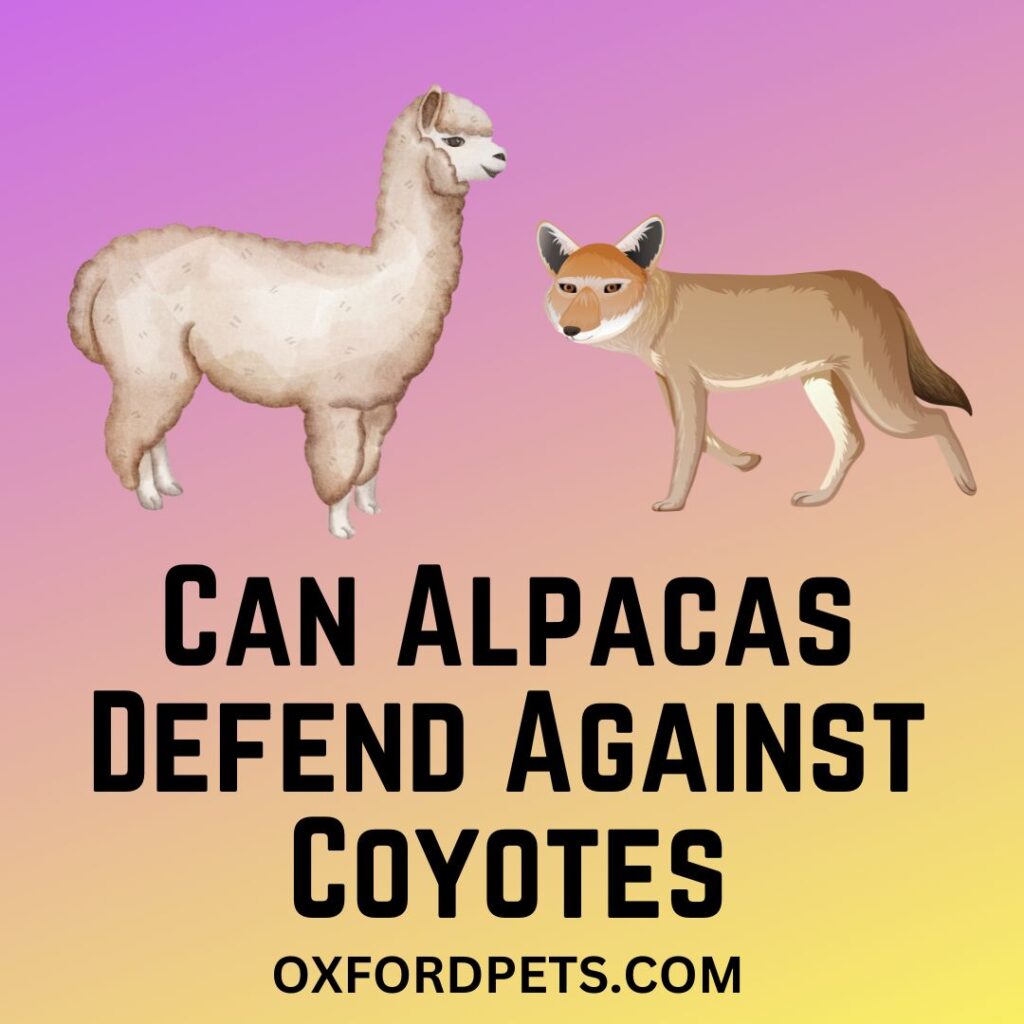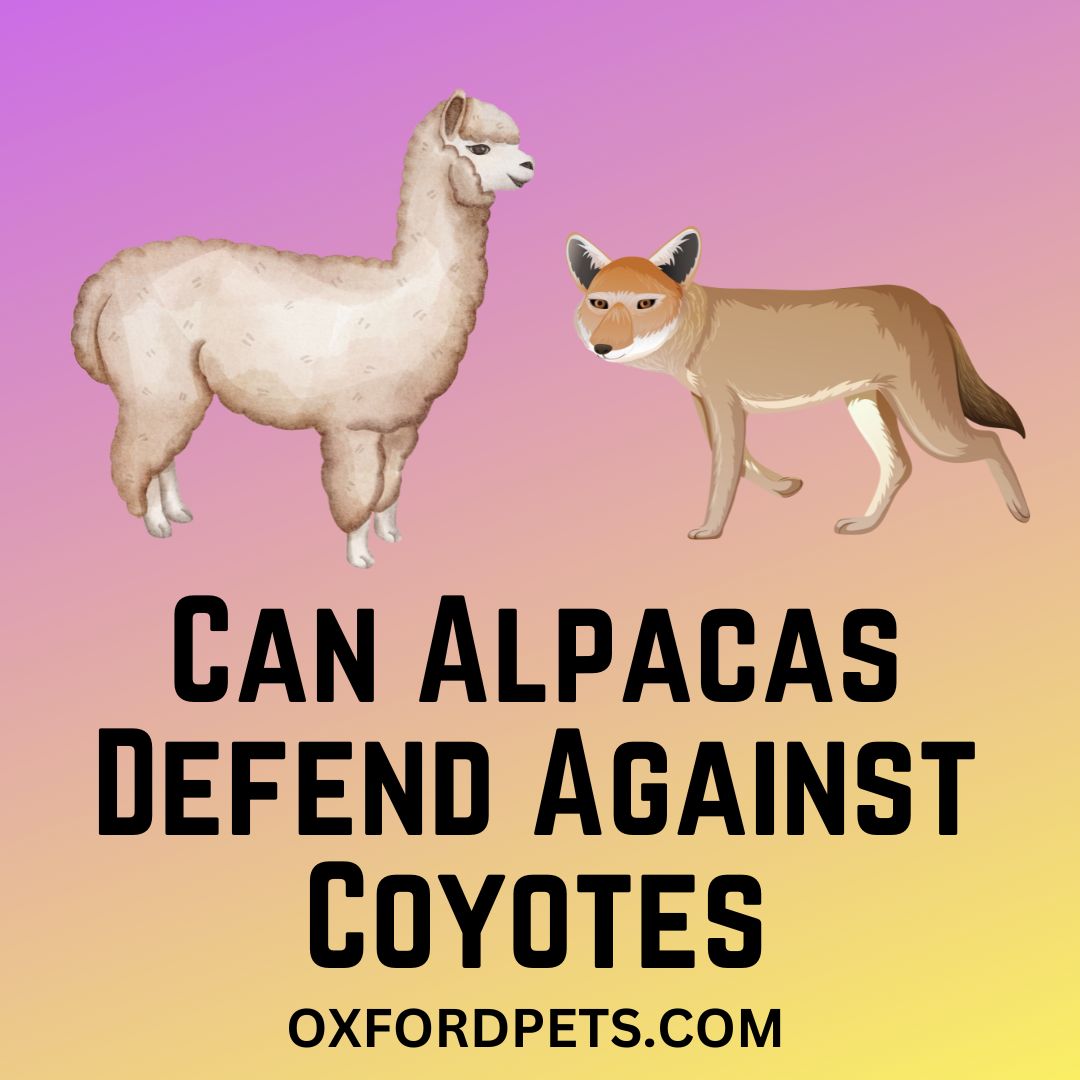Can and Do Alpacas Defend Against Coyotes? The simple answer is Yes, Alpacas are used to safeguard against Coyotes. Moreover, some humans keep them for only this purpose. This creature has a very natural dislike for canines and they automatically become predators for smaller animals.
Alpacas use their teeth, hooves, spitting skills, and long legs to keep coyotes away from their herd. Additionally, there are many farms that use these Alpacas as guard animals.
Adult alpacas are safe from coyotes and can chase small predators to protect the farm. The farm can hold alpacas or other creatures like sheep. On the other hand, baby alpacas can be targeted by coyotes and hence need more protection from other predators.
Alpacas are good guard animals for farm animals like sheep, goats, barn cats, rabbits, and poultry. Their defence mechanisms alert the presence of small predators. However, they can shoo them away as well.

Contents
- 3 Reasons to Choose Alpacas As Guard Animals
- What Animals Alpacas Can Protect?
- Why are coyotes afraid of alpacas?
- Do alpacas attack predators?
- Are alpacas good guardians?
- What are the predators of alpacas?
- Can alpacas turn vicious?
- What is the lifespan of an alpaca?
- Do alpacas spit to defend themselves?
- Do alpacas protect?
- What do alpacas do when scared?
- What are alpacas scared of?
- Do alpacas guard against foxes?
- Do you need 2 alpacas?
- Best Guard Animals
- Final words
3 Reasons to Choose Alpacas As Guard Animals
Alpacas deter small animals
- Alpacas are great guard animals if your farm has a problem with predators like eagles and foxes.
- However, a fox is a larger predator for an alpaca
Non-lethal alpacas
- Livestock guarding is a non-lethal technique of keeping predators away.
- Alpacas are used to scare off and chase off predators rather than kill them.
- These non-lethal techniques are gaining popularity day by day.
- This is because they are legal and non-brutal.
- Moreover, a study suggested that these non-lethal techniques are very effective and not bad for the environment.
Alpacas are very alert
- Alpacas are very alert animals.
- A single alpaca is awake to guard the rest of the herd.
- An alpaca’s defence mechanism is its powerful scream when it senses a predator nearby.
- As they have good vision, sharp sense, and long necks, they can easily recognise their predators.
What Animals Alpacas Can Protect?
| Animals | Things To Keep In Mind |
| Goats | Very compatible they protect goats from eagles, foxes, ravens, and coyotes Alpacas bond easily with them |
| Poultry | Keep coop inside their paddock; Ensure alpacas do not eat chicken feed |
| Rabbits | Keep the rabbits in the alpaca area for more protection |
| Sheep | Keep sheep’s copper away from alpacas |
| Pigs | Keep alpacas in different pens they will be alert if there are predators. |
| Miniature Horses | Alpacas are great with miniature horses |
| Horses | Do not keep both the animals should in the same areaAlpacas do not protect horses |
| Cows | Do not keep both animals together both animals are vulnerable to identical predators |
| Barn Cats | You need to make your cats learn to hang with an alpaca’s paddock |
Why are coyotes afraid of alpacas?
Coyotes aren’t afraid of alpacas however they just avoid them because alpacas can seriously injure them. Coyotes are very opportunistic and prey on small animals that cannot harm them.
When coyotes find that the guard animals are there with the livestock, they just stay away and do not want to indulge in any fight.
Generally, coyotes hunt alone, which can be a very big disadvantage while attacking. When they come near the livestock where alpacas are, it is very easy for them to get killed.
Moreover, coyotes also stay away from them because they can react very aggressively to their prey. Alpacas can bite, kick, charge, and spit on prey and can even kill them.
Do alpacas attack predators?
According to Researchgate, alpacas can attack predators if they are small in size. They cannot take over large predators. Alpacas are very good guard animals for chickens and livestock. They are very efficient in keeping small carnivores away.
Are alpacas good guardians?
Yes, alpacas are good guardians. They, in a group, can bond with animal herds and their ability to shield goats and sheep is commendable. Adult alpacas can guard sheep during and after lambing very well.
What are the predators of alpacas?
The predators of alpacas include
- Domestic dogs
- Colocolos
- Andean condors
- Andean foxes
- Wolves
- Andean mountain cats
- Pumas
- Coyotes
Can alpacas turn vicious?
Alpacas rarely turn vicious. They just respond to the desensitisation of their hind legs if they get great care as youngsters. Biting alpacas are very rare and it isn’t a very common problem. If this occurs, it means that it is attention -seeking behaviour rather than an actual attack.
What is the lifespan of an alpaca?
The lifespan of an alpaca is around 15 to 20 years.
Do alpacas spit to defend themselves?
Yes, alpacas can spit to defend themselves. Spitting is their first line of defence. Basically, this is a social mechanism. Smaller alpacas can be very fast to spit as compared to the Argos alpacas.
This is because they get tired of getting picked. These creatures are raised in big herds and brought to a smaller herd can make them spit to show their dominance.
Do alpacas protect?
Alpacas are hardy, sensible and social animals which have advanced with robust herd instincts. Both males and females are very protective of every other and particularly of their young ones.
What do alpacas do when scared?
Alpacas spit when scared. Like camels, they also frequently spit due to the fact they are distressed; typically, once they experience being threatened. When they experience that they are in danger, alpacas might also additionally shriek, as well.
What are alpacas scared of?
Alpacas are recognized for residing peacefully with canines, while breeds consisting of Great Pyrenees, serve as livestock, protect canines and stay in the alpaca barn and pasture.
In different cases, alpacas may be frightened of canines and defend themselves by spitting, shrieking, or jumping.
Do alpacas guard against foxes?
Alpacas are fox-repellents because in the wild they ought to guard their young ones, as foxes will take a vulnerable or sick infant alpaca if the adults leave it unprotected. With the help of the alpaca’s sharp eyesight and hearing, it is instinctively capable of spotting a predator.
Do you need 2 alpacas?
Alpacas ought to constantly be kept with different alpacas. I will not recommend keeping a single alpaca. They are herd animals and you need to keep them with the same sex to experience safety and not stress.
Best Guard Animals
| Guard Animals | Advantages | Disadvantages |
| Alpacas | Gentle with livestock best guard for fixes low-maintenance | They are also prey to bigger predators |
| Llamas | Amazing protectors can chase and kill predatorsGood guards for ill, birthing, and lost animals | They are not very effective in the singular |
| Guard dogs | Protects the majority of animals from predators.IntelligentVery gentleSmart | Need a lot of training needs socialisation lot of barking at night IndependentWork best in pairs |
| Donkeys | Chase of predatorsEasy to maintain | Can get aggressive with certain animals. |
Final words
Coyotes are predators that frequently hunt alone or in free pairs. They seem like wolves however are smaller. They frequently prey on small animals.
You can use Alpacas to guard those animals against coyotes as they are guard animals that defend their herds fearlessly.
Alpacas are correct livestock protectors as they’re efficient in scaring off predators.
They can do that by biting them, spitting on the predators, or charging toward them aggressively.
When coyotes hunt in groups, however, they can kill alpacas. Alpacas also are prey to big animals like wolves. So alpacas additionally need guard animals, mainly in case you stay in an area in which these wild animals are visible frequently.
I hope you enjoyed the article. I will be back soon with more interesting and informative pieces of writing. Till then, stay connected. Thank you.
